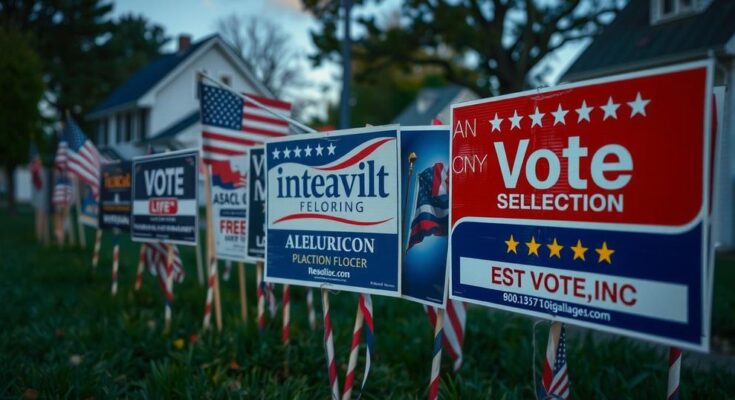The author reflects on their experiences as a newcomer to America during election season, focusing on the significance of yard signs as expressions of political identity. They compare this practice to their past experiences in Kenya, emphasizing the informal and accessible nature of political participation in the U.S. The author shares their personal journey of becoming an active participant in the democratic process, highlighting the empowerment and pride that comes with it.
As a relatively new resident of the United States, particularly in Maine, I have encountered numerous aspects of the electoral process that have both captivated and surprised me. Having participated in my second presidential election, I find myself reflecting on the notable differences between American elections and those I have observed in various parts of the world. My initial experience voting in 2020, during the contest between Donald Trump and Joe Biden, was marked by a blend of excitement and apprehension. As another election approaches, I once again experience a familiar tension regarding the outcome, juxtaposed with the exhilarating act of casting my ballot. Among the most intriguing features of American elections for someone new to the culture is the prevalent use of yard signs. Driving through Maine, one cannot fail to notice these signs dotting the landscape; they manifest as a seasonal phenomenon, blooming across neighborhoods with the onset of the election cycle. For an outsider, they serve as a valuable resource to acquaint myself with local candidates vying for positions ranging from school boards to Congressional seats. Furthermore, they provide a glimpse into the political affiliations of my neighbors, with many displaying signs representing their preferred presidential candidates. This election cycle marks a significant milestone for me, as I have now embraced this American tradition by placing a Harris-Walz sign in my yard, contrasting my neighbors’ Trump-Vance display. Engaging in the simple yet enjoyable pastime of counting the yard signs in my community has become somewhat of a game; it reflects a robust method for individuals to openly express their political viewpoints, a stark contrast to my previous experiences abroad. During my time in Nairobi, Kenya, I noted the absence of such yard signs. The presidential campaign was characterized instead by large billboards and banners depicting the candidates’ faces in public spaces and on transportation vehicles. Although these images were professionally designed, they lacked the personal touch that American yard signs embody. Here, yard signs function as an extension of personal identity—a visual proclamation asserting, “I believe in this candidate, and I want you to know.” What resonates with me most is the informal yet inclusive nature of this practice. In the United States, expressing one’s political opinion is not confined to those privileged by wealth or status. A modest yard sign can convey a message with equal fervor to that of a grand political rally. This notion underscores the core principle that every voice is essential, and a simple gesture can significantly impact the community and the nation’s future. For me, these signs transcend mere political advertising; they embody the fundamental essence of democracy. They serve as a visible testament to my hard-earned right to participate in the electoral process. In many regions worldwide, elections can engender fear and strife. However, in the U.S., amidst the election season’s stress and anxiety, a prevailing sense of freedom, pride, and empowerment emerges. I am now an active participant, able to vote and convey my beliefs through the display of a sign in my yard. While American election seasons are often lengthy and fraught with tension, the accompanying sense of excitement and anticipation is a hallmark of the culture. It cultivates an environment that encourages participation, dialogue, and spirited debate. I find it encouraging that the United States has nurtured a space for such overt civic involvement. As I gear up for my second presidential election, I carry forward the invaluable lessons acquired from my first experience: patience, hope, and the understanding that my vote holds significance. The yard sign in my front yard, while seemingly inconsequential, represents my journey from an observer to a fully engaged participant in the democratic process—an achievement I regard as profoundly meaningful.
The article explores the author’s personal reflections on the American electoral process, particularly focusing on the significance of yard signs during election seasons. As a newcomer to the U.S., the author compares their experiences in America with political campaigns in their home country, highlighting the unique aspects of American democracy that encourage personal expression and civic engagement.
In conclusion, the author illustrates the power of simple expressions of political affiliation through yard signs as a representative aspect of American democracy. They emphasize the accessibility of political participation and the personal connection that these signs foster within communities. The narrative underscores a transformation from an outsider to an active participant in the electoral process, celebrating the freedoms and rights that come with this engagement.
Original Source: www.pressherald.com




